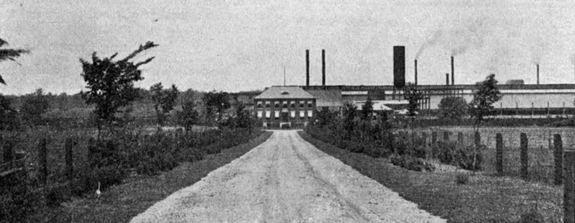Fairfield Wire Works
The Fairfield Iron Works, originally the American Steel and Wire Co., was a subsidiary of U.S. Steel which manufactured steel rods, wire, nails, staples, barbed wire, and woven wire fencing. The company operated a large plant in Opossum Valley just outside Fairfield.
The wire mill was announced before development of Fairfield, and construction began around 1908 with the expectation that the plant would be supplied from the nearby Ensley Works. Many company-built houses in the area were intended for American's work force. Development of the plant, however, was delayed until 1914 when the prospect of wartime demand made it important to increase industrial production. The first wire products left the plant on February 12, 1914.
Once TCI's Fairfield Works went into blast in 1917, American Steel and Wire could be supplied from those furnaces. The wire plant was equipped with two continuous billet-heated furnaces serving rod mills, drawing blocks and a finishing line with 4 galvanizing pans. The plant also had its own machine shop. It had a capacity of producing 110,000 tons of wire rods, 105,000 tons of wire, 60,000 tons of galvanized wire, and 1,010,000 kegs of wire nails annually.
In 1929 the company kept a business office in the Brown Marx Building in downtown Birmingham.
In 1933 American Steel and Wire was made part of TCI, and renamed the Fairfield Wire Works. Another period of wartime production followed. After the war, some returning veterans found they had lost seniority to African American workers. A group of eleven men wrote to United Steelworkers president Philip Murray to complain that, "as it stands now no young white returning veteran can work himself up to a job of Wire Drawer without first helping a negro operator, and gentlemen that will never happen." Union leaders all the way down to the local level, however, defended the seniority of the black workers.
In the 1960s equipment was installed at the Fairfield Wire Works for the production of aluminum conductor steel reinforced (ACSR) core wire, high-tensile tying ware for baling and packaging, and electrically-welded wire mesh reinforcement used in precast and poured-in-place concrete.
The plant closed in 1979.
References
- Nelson, Bruce (2002) Divided We Stand: American Workers and the Struggle for Black Equality. Princeton, New Jersey: Princeton University Press ISBN 9780691095349
- Tennessee Coal & Iron Division, United States Steel Corp. (1960) Biography of a Business . Birmingham: U.S. Steel
